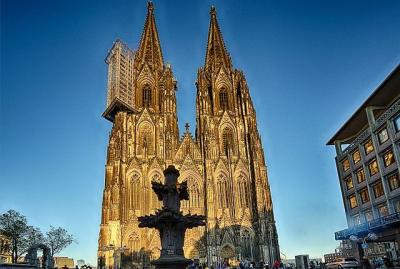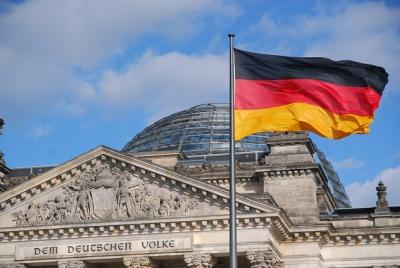For centuries, Germany was criss-crossed by a wall. While nowadays almost only the Berlin Wall and its Germano-German equivalent at the border between the Federal Republic and the GDR are still important in the political sphere with respect to the difference between the mentalities in voting behaviour, an equally formative border remains almost forgotten. The Roman Limes not only stands for the sphere of influence of the Latin culture. Today it also outlines to a large extent the Catholic part of Germany. Of the major European countries, Germany is the only one that was divided not only territorially but also confessionally; with effects that cannot be understated in the European context, in relation to Europe and the traditional idea of Europe.
It should come as no surprise that it was the CDU/CSU that launched the idea of the “Abendland” (generally improperly translated as “West”) in the post-war period as a bracket for the "free" European peoples. This meant the states that had not come under socialist regimes - after nationalism had dominated the German (and not only that) view of the world for over two centuries. From the March Revolution of 1848 onwards, but also in the Empire and the Weimar Republic, national liberalism as its variety did not perhaps always dominate the ballot box, but was explicitly or implicitly the common denominator of the respective established governments.
Even in the times when social democracy emerged as the strongest party, the former direction dominated: even the first leader of the SPD after the Second World War, Kurt Schumacher, can be regarded as a representative of the national-liberal current, despite his party membership. Schumacher did not see the Soviet Union as a possible ideological ally and saw in the communists only the stirrup holders of a "foreign power". Schumacher, who was born in Prussia, preferred a united, national, socialist Germany within the borders of 1937 rather than a partial state bound to the West. This was not the only reason why he could be seen as the antithesis of the Rhenish Catholic Konrad Adenauer.
Adenauer came from a minority in the German Reich that suddenly became the dominant force from 1949. Prussian Berlin was followed by Rhenish Bonn as the provisional capital, situated in a Roman and Frankish area, which was the real nucleus of German culture. Critics - not only in the opposition - reproached Adenauer for turning Germany into a Catholic rump state, a separated Rhineland state, so to speak. They thus drew direct or indirect lines to the French dreams before World War I of degrading Germany to a collection of dependent small territories in foreign dependency, as in the Napoleonic era.
This is a powerful image that was considered a narrative of terror, especially in the 19th century. Not least by German-Prussian historiography, which wanted to portray the "victor of history", namely Prussia unifying Germany, as the guarantor of German freedom and the only legitimate hegemon of Germany. Incidentally, this was not only directed against foreign France, but also against Austria, which had dominated Germany until 1866 and was finally forced out of German politics by Bismarck after the German-German War was won.
As a memory, however, such narratives have remained extremely fresh in the people’s minds to this day, especially among many German conservatives who either do not see themselves in Adenauer's tradition or perceive the “Westbindung” as the wrong decision. Such accusations not only seem strange in view of the past and the success story of the young Federal Republic; they seem almost absurd when one looks at the alternatives that would have existed for post-war Germany. In a misjudgement of the significance of the Stalin Notes, many political dreamers to this day consider them a realistic proposition. This refers especially to the note from the Soviet dictator offering Germany unity if it remained neutral. That this was a mere disruptive manoeuvre shortly before the signing of the EVG treaties is something that many Germans, even in the academic world, do not want to believe.
With the opening of the Soviet archives, it has finally become clear that Stalin never had any plans to allow the reunification of Germany. Yet this does not prevent a number of revisionists from blaming Adenauer for the division of Germany and from accusing him of a vague Rhenish separatism. Here, too, the Prussian-Protestant soul of Germany north of the Limes lives on, and it does not manage to make its peace with the other side. The Faustian division of "two souls in one breast" lives on in the German conservatism - and this applies not only to the interpretation of the past, but also to current politics, especially to Germany’s relationship to Europe.
For Adenauer's legacy is claimed by the CDU. He is regarded as the Union's founding father, although his ideas have virtually no substance left in the party. Adenauer was a conservative in that his political convictions had a metaphysical origin in many respects. They were founded on Rhenish Catholicism. Adenauer, who had already been Mayor of Cologne under the Empire, knew very well the position of Catholics in what was then Prussian Germany. The political Catholicism of the Empire stood out as highly ultramontane in many respects, especially after the experiences of the Kulturkampf between Bismarck and the Holy See. Catholics were reproached for orienting themselves first to Rome and only then to Berlin.
The Rhineland, however, often had a middle position in its long history. Historically, it was the actual region of origin of the medieval German Empire, symbolised by Aachen as Charlemagne's capital or Speyer as the site of the Salians. Four of Germany's seven electors originally resided on the left bank of the Rhine. From the 19th century onwards and under the dominance of Prussia, however, the territory on the left bank of the Rhine was no longer perceived as the heartland but as a peripheral area of the empire, which was only broken up by the fact that the Rhineland north of the Eifel had gained an economic importance that could not be negated with the onset of industrialisation.
This was not only the historical image from which Adenauer's thinking stemmed, but also the starting point of Helmut Kohl's view of history. He, as a Palatine, also came from a Rhenish Catholic family. Allegedly, Kohl invited state guests to Speyr Cathedral, not only to show the rich medieval German heritage, but also because that very medieval empire had ensured peace and order in Europe. Kohl's idea of Europe was thus equally metaphysical in content. The euro was not conceived primarily in economic terms, but stemmed from the idea of order. Europe - and Germany in particular - was to be so bound to the new currency that it could no longer break. The fact that Kohl's idea had little to do with the Brussels Europocracy that emerged later in reality was shown not least by the fact that until his death Kohl considered Hungarian Prime Minister Viktor Orbán to be one of his closest allies. Kohl's idea of Europe, like that of Adenauer, was probably inspired more by a Carolingian Catholic substratum than by a morbid administrative apparatus that exists for its own sake.
It is not without irony that the CDU under Angela Merkel, who as a Protestant pastor's daughter from the East, had no connection whatsoever to these metaphysical ideas of Adenauer and Kohl, de facto consigned this heritage to the dustbin of history in favour of an amorphous empire that has promoted left-wing progressive ideas, ever more bureaucracy and, most recently, a censorship and punishment mechanism. During her chancellorship, Merkel repeatedly emphasised the European idea, but because of her background, she was unable to grasp what her foster father Kohl, for example, understood by "Europe". In fact, as a Protestant from the East who grew up under socialism, Merkel was far more a representative of the old Prussian model than many still want to understand today. With her, Bonn really only arrived "back at Berlin". Not without reason, the impression that the Germans used the European Union primarily to assert their own economic and political interests falls into her era. The most eminent examples include Greece with the de facto decapitation of a sovereign country, Italy with the demise of Silvio Berlusconi, as well as Poland and Hungary with the promotion of "woke" ideas, such as unrestrained immigration.
So where are the heirs of the true conservative European spirit? The bitter truth is that they are not to be found in Germany. While in the Romance countries, for example, a positive reference back to the Roman Empire or at least the Christian Middle Ages can be taken as a common frame of reference, this is hardly possible in Germany. The CDU, which has drifted to the left, cannot have anything to do with Christian roots, as they would contradict the ideas of the LGBT community, family policy or the left-liberal agenda.
And the AfD? It has problems like any collective movement that suddenly offers a refuge after decades of disorientation of formerly party-affiliated representatives. At its core, it is not a conservative but a national-liberal party. Even at its founding, when it was still derided as the "professors' party", the European question was primarily a euro question. Some wanted an exit from the euro; others a slow unwinding; still others a northern euro. The resentment against the "lazy" southern countries (including France, depending on their mood) and their own identification as the "paymasters of Europe" indicate that Europe was perceived in a similar way as in the Merkel Union. Namely, as an instrument for cost-benefit calculation, but this time under the negative sign. So Germany is once again a separate state under foreign influence?
This national-liberal current, which has nothing to do with either Christian or Roman identity, still dominates in many places, but the idea of what Europe should look like has become even more defragmented. Among the national conservatives, who are stuck in the Prussian-Protestant tradition in terms of the history of ideas, no positive reference to either the Roman Empire or to universal Catholicism can be established. And with the völkisch element gaining strength, after a phase of "balancing identities" (regional, national, civilisational), now rather a clod consciousness prevails. Between the national and the nationalist tracks, in turn, there are spirits characterised by diffuse revisionist views, who condemn Adenauer's work or, depending on their taste, stylise themselves in a new reformation in Luther's sense, or as Arminius against the EU empire.
For the historian, it is not infrequently fascinating to see which long-forgotten propaganda of the 19th century is still effective, whether in a specific renaissance of Francophobia - after all, the EU is controlled from Paris - or a rebirth of arrogance towards the Mediterranean peoples. Many of them probably also seek to defeat Adenauer half a century after his death. The fact that today the secularised East of Germany determines the AfD's strategies because of its voter potential does the rest.
Although a candidate on the AfD's European list claimed shortly after the party conference that the presence of European representatives would expose as a lie the myth that the AfD is isolated in Europe, it was not so much the presence as the absence of certain European allies that said much more about the state of the AfD and its vision of Europe than the party might want to admit. The uncertainty about the AfD's "Europeanness" should not, however, make us forget a much more important point: namely, that the legacy of Adenauer and Kohl remains unnoticed in both the Union and the AfD. While the CDU trots after the EU idea without knowing exactly what should constitute a real European Union, the AfD shows itself as torn as the German conservatism itself. Perhaps the political idea of the “Abendland” in Germany will remain a mere episode: the times when Rhenish Catholics determined the direction of Germany have probably been finally over since the fall of the "second wall".
Read also
In the stranglehold of the climate extremists
At the carnival parade in Düsseldorf, one float caught the eye: it showed a member of the climate extremist "Last Generation" fighting a “car monster”. Düsseldorf thus adopted the common narrative of "David against Goliath" and assigned the role of heroes to the extremists - not least because the slogan underneath, "Who's the climate terrorist here?" made it clear that the CO2 guzzlers are responsible, not the activists.
Marco Gallina
The Catholic Church in Germany is in a worse situation than in 1517
The Archbishop of Cologne is one of the most important representatives of the Catholic clergy not only in Germany, but worldwide.
Marco Gallina
A green economy minister threatens a touristic nature paradise
Rügen is a place of romantic longing for many Germans. Today, the largest island in the republic has primarily the reputation of a tourist resort, seaside place and nature reserve. And one artistic vision of it remains especially vivid in the German soul: a romantic painting by Caspar David Friedrich, the chalk cliffs in which have etched themselves into our memory.
Marco Gallina
Country Report: Germany, June 2023: The “Ampel”-Coalition wants the heat pump at any price - and is causing political instability
The German government is increasingly slipping the reins. For months it has been arguing about its latest project: the "heat turnaround" (“Heizungswende”). The project is modelled on the “energy turnaround” (“Energiewende”) that forced Germany to phase-out of nuclear power and scooped up "renewable energies" with the watering-can principle.














Comments (0)